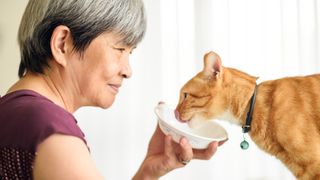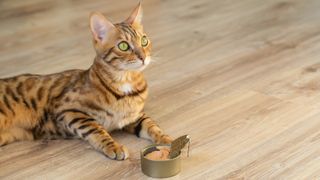Foods kittens can eat besides cat food
Looking for foods your kitten can eat besides cat food? Check out these vet approved options!

You’ve done your research and found a nutritious and delicious kitten food: now what? You may be wondering what foods your kitten can eat besides cat food.
While the majority of your kitten’s diet should be come from the best kitten food, it’s okay to give some additional foods in moderation. In fact, if you're concerned about a kitten not eating as much as you think they should, tempting them with treats can be a great way to tempt them back to their food bowl.
Giving your kitten treats can also be an important part of training and bonding with your kitten. But whatever treats you choose must be healthy, safe, and palatable. You should also limit your kitten’s treat intake to no more than 10% of his daily calorie intake to prevent excess weight gain.
Fortunately, there are many treat options that are both tasty and low in calories. Try these seven tasty treat ideas for your kitten!

Dr. Elizabeth Racine is a small animal general practice veterinarian with a bank of knowledge on all things pet health and wellness. She is especially interested in veterinary behavior, nutrition, and internal medicine. Dr. Racine also has experience writing content for the American Kennel Club, Merck Animal Health, Bayer PetBasics, Elanco, and CareCredit.
Seven Foods Kittens Can Eat Besides Kitten Food
1. Kitten Milk Replacer
Dairy products like cow’s milk are not good for cats because cats are naturally lactose intolerant and may develop gastrointestinal upset as a result of consuming dairy products. However, kitten milk replacer is specially formulated for young kittens to closely match the carbohydrate, protein, and fat content of a mother cat’s milk. This product is often used for orphaned kittens or those whose mothers are unable to produce enough milk to feed them adequately. If your kitten is old enough to eat solid food - usually 6 weeks of age or older - he no longer needs milk and you don’t need to feed kitten milk replacer. But if you have your heart set on seeing your kitten lapping at a bowl of milk, kitten milk replacer is a much safer and healthier alternative to regular milk.
2. Fresh Cooked Meats
Fresh cooked meat like boiled boneless skinless chicken breast or turkey breast are great to use as high-value treats for your kitten. Choose cuts that are low in fat and avoid using seasonings or salt. Be sure to cook the meat thoroughly, as raw meat can harbor bacteria that can make your kitten sick. Raw meat diets are not recommended for pets and particularly not for growing animals, according to board certified veterinary nutritionists. And while fresh cooked meat is okay in moderation as a treat for your kitten, it should never make up your kitten’s entire diet because it does not contain all the vitamins and minerals your kitten needs to support healthy growth and development.
3. Human Baby Food
Human baby foods like ground chicken, turkey, or ham can be super tempting treats for kittens and are great to use when training! These foods are highly palatable to tempt fussy babies to eat and kittens love them, too. Use a small amount on a spoon or popsicle stick to lure your kitten into desirable behaviors like using the scratching post or you can even try training your kitten to do tricks! Before purchasing, check the container to make sure that they don’t include onions or garlic - sometimes these ingredients are included in baby foods for flavor, but they are toxic to cats.

4. Fresh Cooked Fish
Fish is a good source of fatty acids and protein. Cats can eat many different types of fish, including tuna, salmon, tilapia, and cod. Like fresh meat, fish should be cooked thoroughly before feeding it to your cat to reduce the risk of bacterial contamination and parasites. Fresh fish also should not be the only component of your kitten’s diet as fish alone does not provide all the nutrients your kitten needs. Your kitten should eat a complete and balanced kitten food as his primary diet, and can have the occasional bit of fresh cooked fish as a treat.
5. Eggs
Eggs are a great source of protein and vitamins and are safe for your kitten to consume as long as they are properly cooked. Try offering your kitten a bit of scrambled or boiled egg to see if he likes the taste. As with humans, always make sure the eggs are fully cooked and free of shells to reduce the risk of Salmonella, which can cause diarrhea, dehydration, fever, lethargy, and loss of appetite.
6. Vegetables
Many cats dislike the taste of vegetables, but some are happy to munch on some fresh spinach or sweet potato. Vegetables make a great low-calorie treat for your cat. Most vegetables are safe for cats, just avoid anything in the allium family - like onions, garlic, and chives, which are toxic to cats. If you’re unsure if your cat’s stomach can tolerate a certain food, try offering a very small amount first and monitoring your cat for any gastrointestinal upset. If your cat does well, it’s okay to offer a bit more the next day.
7. Fruits
Fruits are another category of human food that some cats dislike, but other cats love! Try offering your cat fresh or frozen blueberries, strawberries, or sliced watermelon. Most fruits are safe for cats, but you should avoid grapes and raisins which can cause acute kidney injury in some cases. Dried fruits with added sugar should also be avoided, as excessive sugar is not healthy for your kitten. As with vegetables, if you do decide to offer fruit to your kitten, offer small amounts at first to see if your kitten can tolerate it. If no gastrointestinal symptoms are observed, it's okay to offer more at the next session.
How often should you feed your kitten additional foods?
Remember, your kitten does not need to eat any food other than his regular kitten diet. Any additional foods or treats you decide to give must be given in moderation to prevent excess weight gain and dietary imbalances.
To ensure your kitten maintains a healthy body weight and a balanced diet, limit extra foods and treats to no more than 10% of your kitten’s daily calorie intake, or about 20-30 calories a day. For example, this would be a maximum of about two teaspoons of cooked chicken breast a day. The rest of your kitten’s diet should be made up of a complete and balanced commercially made kitten food. For help choosing kitten food, see our guide to which kitten food is best or ask your veterinarian for product recommendations.
PetsRadar Newsletter
Get the best advice, tips and top tech for your beloved Pets
Dr. Elizabeth Racine is a small animal general practice veterinarian covering all things pet health and wellness. Her special interests include veterinary behavior, nutrition, and internal medicine. As a freelance writer, Dr. Racine has written content for major companies in the industry such as the American Kennel Club, Merck Animal Health, Bayer PetBasics, Elanco, and CareCredit. In her free time, Dr. Racine enjoys playing trampoline dodgeball, hiking with her beagle Dasher, and spending time with her three mischievous cats. Dr. Racine can be found at www.theveterinarywriter.com and at https://www.linkedin.com/in/eracinedvm/
